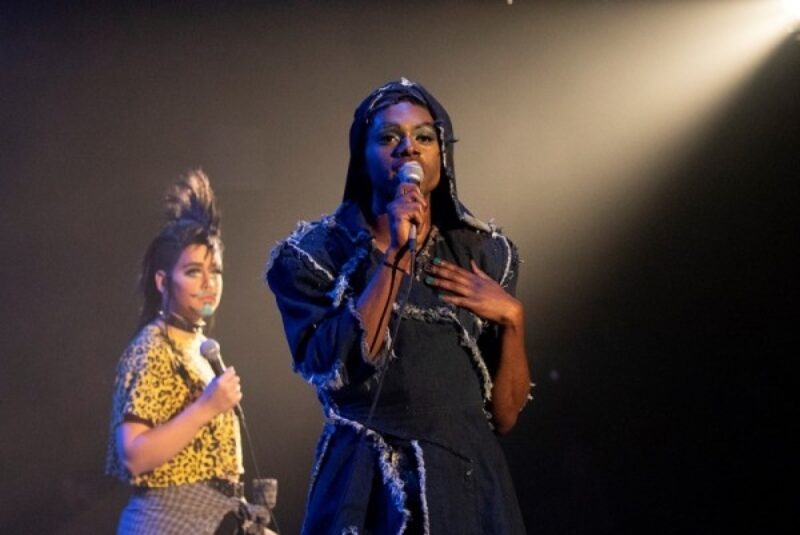Hedwig Gives in to the Unknown
Review of Hedwig and the Angry Inch at ArtsWest, written by TeenTix Press Corps Member Anya S!

Hedwig and the Angry Inch is not your typical Broadway musical. Instead of chorus lines and tap numbers, the show features an onstage band and 90 minutes of punk rock. On top of that, the characters are eclectic. There’s Hedwig (played by Nicholas Japaul Bernard), who struggles to come to terms with her identity after a botched sex-change operation (although she is genderqueer, she uses she/her pronouns); Yitzhak (played by Dani Hobbs), Hedwig’s husband, whom she hates; and the unseen Tommy Gnosis, a rock star and Hedwig’s ex-lover, who abandoned her after learning that she was not technically a woman. Through these characters, their relationships, and dramatic, powerful songs, the show presents its central message: that one must embrace change and the unknown.
Throughout the show, Hedwig seems fixated on the past and present, instead of looking to the future, something that was mirrored in the staging. Because we normally read from left to right, stage left (from the audience’s perspective) is reminiscent of the past, while stage right symbolizes the future. During the show, Hedwig tended to stay stage left/center, displaying her obsession with her life before the operation and her relationship with Tommy, as well as her inability to focus on her current self and what’s to come. On the other hand, Yitzhak, who sits stage right, essentially becomes the show’s future—at the end of the show, they sing alone while Hedwig leaves the stage.
Hedwig’s lack of enthusiasm for the future and the unknown also plays into her relationship with Yitzhak. Hedwig knows Yitzhak is a better performer than she is, and the two fight onstage from the opening number—going into a sing-off that culminates in Hedwig pulling the cord out from Yitzhak’s mic. In fact, Hedwig was uncaring from the beginning of their relationship—when she agreed to take Yitzhak back to America, Hedwig forced them to stop performing in drag. However, by the end of the show, Hedwig gives in to Yitzhak, allowing them to perform while she pursues her goal of finding Tommy. Because Yitzhak represents the future, Hedwig’s interactions with them are telling of Hedwig’s development throughout the show. Though she has grown to hate the uncertainty of the future because of Tommy, she eventually gives in to the unknown and follows her dream of love.

Chris DiStephano and Nicholas Japaul Bernard in Hedwig and the Angry Inch at ArtsWest. Photo by John McLellan.
Hedwig’s struggle with her identity is also an integral part of the show. Hedwig is described as the Berlin Wall, an apt metaphor. After the Wall came down, the two sides of Berlin had to reconcile, just as Hedwig must come to terms with both her male and female identities. Similarly, during the song “The Origin of Love,” Hedwig sings about a mix of religions, and, as religion is often seen as a part of one’s identity, this foreshadows how Hedwig must learn to appreciate both sides of herself. However, at the show’s end, Hedwig takes off her clothes, stripping off the emotional wall she’s placed between her opposing identities. Then, without posturing, she begins to figure out who she really is. The audience only sees the beginning of this process, but the cliffhanger leads to a more believable ending.
Identity is tricky—unlike on Broadway, someone cannot flip a switch and immediately understand themselves. One’s view of their identity is constantly changing in response to new experiences, so it is impossible to be completely aware of every facet of one’s being. Because Hedwig does not instantly come to terms with her identity, but rather, begins to, the show is able to portray a more realistic narrative.
However, she would not have even questioned her identity if she had not begun to value the variability of the unknown. By opening herself up to change, her perception of her identity started to change as well, and she could appreciate herself in her entirety. Hedwig and the Angry Inch supports the idea that humans should stop dwelling on the past. And Hedwig shows us that, by accepting the change the future brings, people can discover more about themselves.
The TeenTix Press Corps promotes critical thinking, communication, and information literacy through criticism and journalism practice for teens. For more information about the Press Corps program see HERE.


